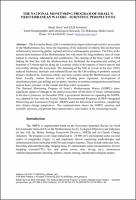Chapter The National Monitoring Program of Israel's Mediterranean Waters – scientific perspectives
| dc.contributor.author | Herut, Barak | |
| dc.date.accessioned | 2023-05-01T13:45:54Z | |
| dc.date.available | 2023-05-01T13:45:54Z | |
| dc.date.issued | 2022 | |
| dc.identifier | ONIX_20230501_9791221500301_248 | |
| dc.identifier.uri | https://library.oapen.org/handle/20.500.12657/62832 | |
| dc.description.abstract | The Levantine Basin (LB) is considered an impoverished and sensitive ecosystem in the Mediterranean Sea. Since the beginning of the industrial revolution this sea has been influenced by increasing global, regional and local anthropogenic pressures. The LB is at the eastern most terminus of the Mediterranean Sea with relatively long residence time of water subject to warming, salinization and acidification. The opening of the Suez Canal in 1864 linking the Red Sea with the Mediterranean has facilitated the migration and settling of hundreds of Eritrean species along the Levantine coasts at the expense of native species and irreversibly altering the ecosystem | |
| dc.language | English | |
| dc.relation.ispartofseries | Monitoring of Mediterranean Coastal Areas: Problems and Measurement Techniques | |
| dc.subject.classification | thema EDItEUR::R Earth Sciences, Geography, Environment, Planning::RN The environment | en_US |
| dc.subject.other | Monitoring | |
| dc.subject.other | Mediterranean Sea | |
| dc.subject.other | Levantine basin | |
| dc.subject.other | Climate Change | |
| dc.subject.other | Marine Pollution | |
| dc.title | Chapter The National Monitoring Program of Israel's Mediterranean Waters – scientific perspectives | |
| dc.type | chapter | |
| oapen.identifier.doi | 10.36253/979-12-215-0030-1.64 | |
| oapen.relation.isPublishedBy | bf65d21a-78e5-4ba2-983a-dbfa90962870 | |
| oapen.relation.isbn | 9791221500301 | |
| oapen.series.number | 1 | |
| oapen.pages | 8 | |
| oapen.place.publication | Florence |

